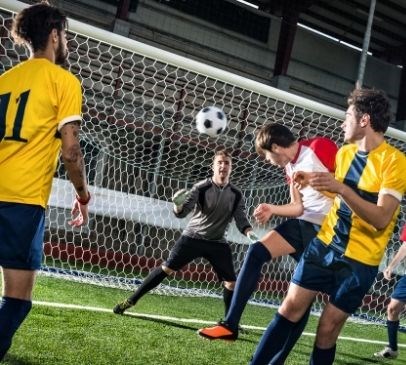The study, led by Professor Willie Stewart and colleagues at the University of Glasgow, looked at the health records of around 8,000 Scottish former professional footballers and 23,000 matched general population controls for comparison.
It found that for goalkeepers, neurodegenerative disease risk was similar to general population levels. In contrast, the risk for outfield players was almost four times higher than expected and varied by player position with risk highest among defenders, at around five-fold higher than expected.
These new findings also show that neurodegenerative disease diagnoses increased with increasing career length, ranging from an approximate doubling of risk in those with shortest careers to around a five-fold increase in those with the longest careers.
These results add to the observations from the 2019 FIELD study publication, which found that former professional footballers had an approximately three-and-a-half-fold higher rate of death due to neurodegenerative disease than expected.
However, despite changes to the weight and composition of footballs over the years, there is no evidence that the risk changed for the population of footballers included in the study, whose careers spanned from around 1930 all the way to the late 1990s.
Commenting on the results, Prof Willie Stewart said: “We have already established that former professional footballers are at a much greater risk of death from dementia and other neurodegenerative disorders than expected.
“Taking these new results together with our and others post-mortem findings and data from our previous FIELD studies, the evidence is clear that the standout risk factor for neurodegenerative disease in football is exposure to head injury and head impacts.
“As such, a precautionary principle approach should be adopted to reduce, if not eliminate exposure to unnecessary head impacts and better manage head injuries in football and other sports.”
Headway has repeatedly called for additional research into the impact of heading footballs. Commenting on these latest findings, Peter McCabe, Headway Chief Executive, said: "This study strengthens the growing body of evidence relating to the long-term implications of heading footballs.
"We have known for a long time that repeated blows to the head, such as those suffered by boxers, can make people more susceptible to degenerative neurological conditions such as dementia. What we're now seeing is clear evidence that heading footballs can also significantly increase those risk factors.
"Whilst the new guidelines set out by the FA to reduce the number of times a ‘higher force header’ can be carried out in a week to 10 is a first step in addressing the risks, there remain significant questions about the science upon which the new rules are based or indeed how it will be managed - particularly at grassroots level.
"This has to be just the start of the conversation."
Back











